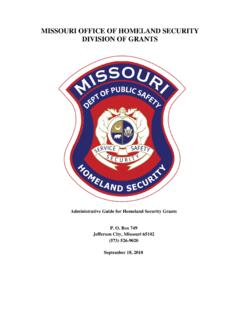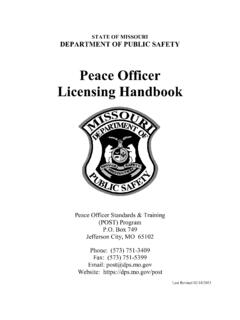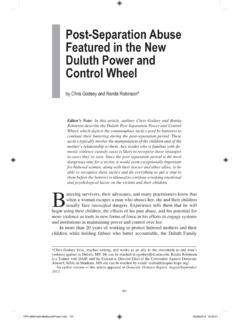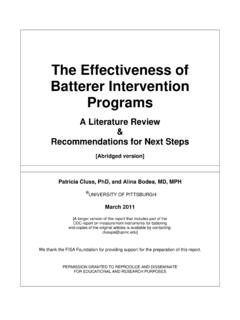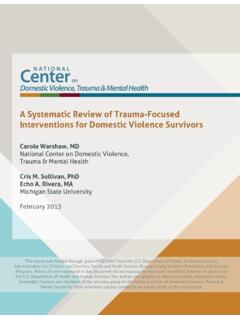Transcription of MCADSV STANDARDS FOR Batterer Intervention Programs
1 McadsvMissouri Coalition Against domestic and Sexual ViolencemcadsvmcadsvmcadsvSEPTEMBER 2018 MCADSV STANDARDS FORB atterer Intervention ProgramsMissouri Coalition Against domestic and Sexual Violence ..3 DECLARATION OF PRINCIPLES ..4 COORDINATED COMMUNITY RESPONSE ..5 PROGRAM REQUIREMENTS ..6 Policies and Procedures ..6 Length of Groups ..7 Fees for Services ..7 Curriculum ..7 LANGUAGE ACCESS ..9 COUPLES COUNSELING ..10 WOMEN WHO USE FORCE ..11 Batterer Intervention WITH THE LGBTQ COMMUNITY ..13 INTAKE PROCEDURES ..15 Exclusion Criteria ..15 Program Agreement.
2 15 STAFF QUALIFICATIONS AND TRAINING ..16 Facilitators ..17 SURVIVOR/CURRENT PARTNER CONTACT ..18 PROGRAM COMPLETION ..20 PROGRAM EVALUATION ..20 SELF-EVALUATION TOOL FOR Batterer Intervention Programs ..21 Coordinated Community Resonse ..23 Length of Groups ..27 Fee for Services ..28 Curriculum ..29 Couples Counseling ..30 Intake Procedures ..31 Exclusion Criteria ..33 Program Agreement ..34 Staff Qualifications and Training ..35 Survivor Safety and Contact ..36 Program Completion ..38 REFERENCES ..393 Missouri Coalition Against domestic and Sexual Violence original MCADSV STANDARDS and Guidelines for Batterer Intervention Programs was developed by the Missouri Coalition Against domestic and Sexual Violence Batterer Intervention Policy Workgroup and approved by the MCADSV Board of Directors on July 8, 2005.
3 The workgroup included advocates from Batterer Intervention Programs , representatives from the Missouri Department of Corrections Division of Probation and Parole, and those who work with individuals and their children who are victimized by domestic violence throughout Missouri. In 2017, the workgroup reconvened to review, evaluate and update these STANDARDS to reflect the current practices of Batterer Intervention Programs . The STANDARDS reflect the commitment to end violence against women through direct Intervention with perpetrators of violence against following framework served as a basis for the development of these STANDARDS : These STANDARDS are to be used as a guide for best practices in the operation of a Batterer Intervention program and are not to be used as a training document.
4 Dynamics of abusive relationships develop, in part, from the institutional imbalance of power between men and women, sex-role stereotyping, beliefs in male entitlement and privilege, gender-based values and misogyny, and homophobia and other forms of intersecting oppressions; Abuse comes in many different forms of power and control; Battering is a pattern of assaultive and coercive behaviors that batterers use against their intimate partners that include physical, sexual, emotional and psychological attacks, as well as other forms of coercion; Victims of domestic violence tend to fight for survival, while those who batter fight for control; All people are capable of abusive behaviors; and Abuse can occur in same-sex STANDARDS were designed to assist Batterer Intervention Programs that work with men who batter women.
5 STANDARDS specific to Programs that serve women who use violence or address domestic violence in the LGBTQ community also can be found within this document. MCADSV STANDARDS FOR Batterer Intervention PROGRAMS4 Missouri Coalition Against domestic and Sexual Violence OF PRINCIPLESMCADSV STANDARDS for Batterer Intervention Programs is based on the following principles: The safety and rights of survivors must be the highest priority; It is not the responsibility of a survivor to hold the Batterer accountable. Batterers are solely responsible for their violent and abusive behavior; No form of abuse can ever be tolerated; domestic violence offenders are a separate category of violent offenders and require a specialized Intervention ; Intervention Programs alone do not create Batterer accountability.
6 They are a component of a larger community response that includes the courts, probation and parole, and the legal and law enforcement systems; Before a Batterer Intervention program is developed, it is imperative a community-wide system has been established that collaboratively works on an ongoing basis to ensure services for survivors and the legal system create greater safety for women who have been battered; Effective Batterer Intervention providers should consult with advocates who work directly with women to develop new Programs , assess the need for substantial program policy changes within existing Programs , and conduct periodic program reviews; Batterer Intervention Programs must focus on ending violence and abuse and not on saving relationships; There are limitations to a Batterer Intervention program.
7 Intervention is not a guarantee that a Batterer will cease his violence and abuse; Women should never be placed in Batterer Intervention groups with men; A victim is not responsible for being abused and never should be ordered or mandated to obtain services due to the circumstance of being victimized by domestic violence; Batterer Intervention Programs should support social policy that states domestic violence is a crime and must have consequences or sanctions to hold batterers accountable. Diversion Programs are discouraged; Batterer Intervention Programs should never state that a Batterer is, or will be, nonviolent upon completion of the program s requirements.
8 And Batterer Intervention Programs developed out of the grassroots efforts of the women s anti-violence movement and should strive to honor the principals of survivor-centered Coalition Against domestic and Sexual Violence Community ResponseCOORDINATED COMMUNITY RESPONSEA Batterer Intervention program should not exist without a coordinated community response to domestic violence and Batterer Intervention program must not exist in isolation, as it is only one component of a coordinated community response. A coordinated community response identifies domestic violence and intervenes consistently.
9 This response requires the creation of cooperative strategies that effectively deliver a consistent and supportive response to Batterer Intervention program should have a particularly collaborative and interactive relationship with the community s victim services agencies. The priority of a coordinated community response to domestic violence is the safety and protection of women who have been battered. This approach holds batterers accountable for their violence and abuse. A coordinated response to domestic violence includes community education that builds community awareness and results in a unified demand for a zero-tolerance response to domestic violence.
10 Communities need to develop and maintain community responses that bring together all organizations and systems that have contact with survivors or perpetrators of domestic violence. This can include representatives from: Batterer Intervention Programs ; Children s protective services; Children s service providers; Clergy and the faith community; domestic violence Programs ; Hospitals; Judges; Law enforcement; Legal services; Mental health agencies; Probation and parole; Prosecuting attorneys; School districts; Substance abuse Programs ; Survivor service providers; Guardians ad litem; Culturally specific organizations that serve marginalized communities; Programs that promote non-abusive parenting.
